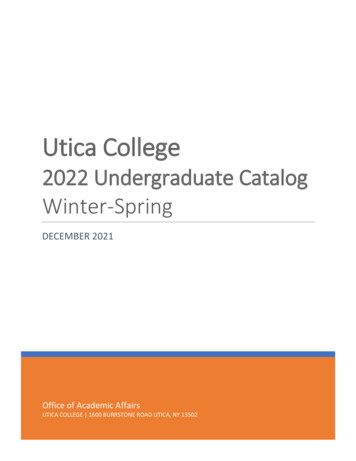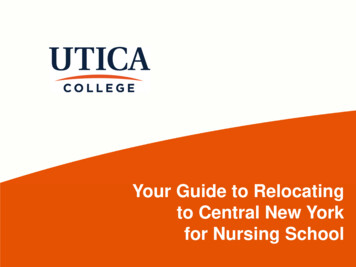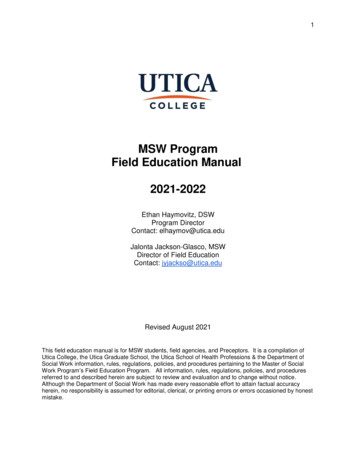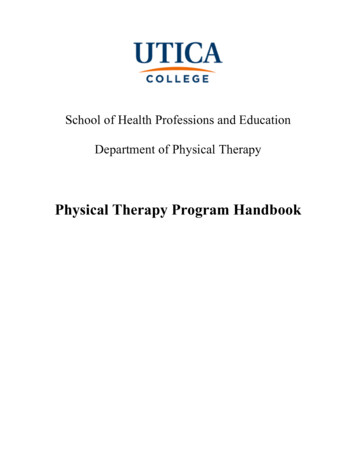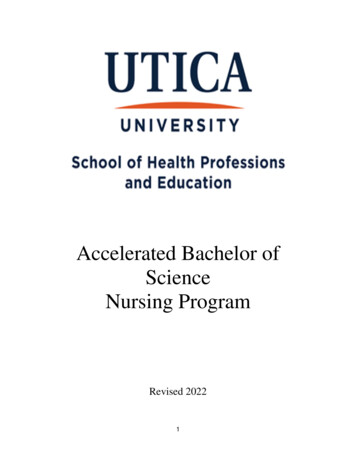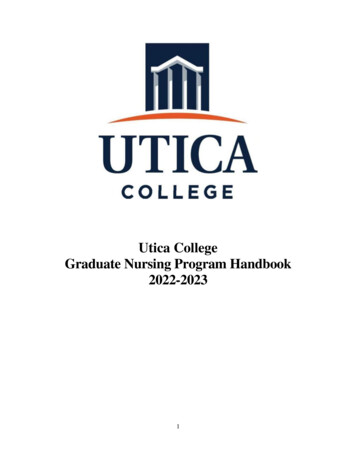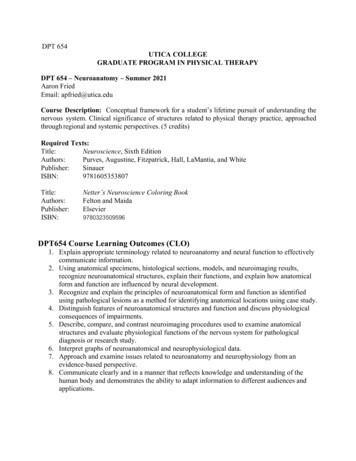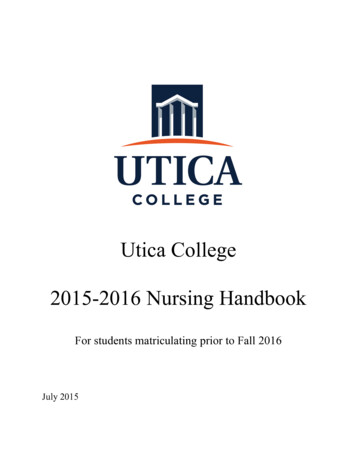
Transcription
Utica College2015-2016 Nursing HandbookFor students matriculating prior to Fall 2016July 2015
TABLE OF CONTENTSPAGEFaculty and Administration. .4Notice of Compliance .5Mission Statement .6Admission Criteria 7Nursing Program Curriculum 8Sequence of Courses .12Intellectual Honesty Policy .13HIPPA 13Social Media Policy .14American Nurses' Association Code of Ethics for Nurses .15Academic Rules and Regulations .16Grading Policy . 16Testing Policies .18Major Honors in Nursing .20Procedure for Modified Progression and Dismissal . .21Procedure for Appeals .22Rules and Regulations Pertaining to the Clinical Experience .24Uniform Policy . .26Health Clearance Requirements .27CPR/BLS Certification . .28Alcohol and Drug Policy . 28Health Insurance . .29Malpractice Insurance . .29Estimated Costs Associated with the Nursing Major .30Lab and Audiovisual Use 31Additional Information 322
WELCOMEThe nursing faculty and staff welcome you to Utica College. The College's approach to education isbased upon a philosophy dedicated to the cultivation of a liberally educated professional person.Each student is offered a unique blend of liberal arts and professional educational experiences. Weencourage you to take full advantage of the variety of learning opportunities while pursuing youreducational goal of becoming a professional nurse.PURPOSE OF THIS HANDBOOKThis handbook is to be used in conjunction with the Utica College student handbook, andstudents are responsible for adhering to the content of both handbooks. Changes in policies andprocedures may be made annually and communicated to students via the updated handbook. Thecurrent nursing department handbook can be found oks.cfmThe information included in this handbook has been chosen with two purposes in mind. First, aninformed student is a better student. We want students to understand the educational goals andmission of the entire program in order to facilitate integration of individual course content intoyour overall view of the nursing profession.Second, the faculty and staff take seriously the responsibility of providing students with a qualityeducation that will prepare them to fulfill their responsibilities as a professional nurse. However,the student is the one ultimately responsible for taking full advantage of the program. Thishandbook provides students with the information necessary for them to take on thatresponsibility.3
DEPARTMENT OF NURSINGFACULTY AND ADMINISTRATIONAssociate Dean of NursingCatherine Brownell, PhD, RNAssociate Professor of NursingAddison Miller White Hall, Rm. 238(315) 792-3174 (Administrative Assistant)cbrownell@utica.eduClaudette Abounader, MS, RN, ANPAssistant Professor of NursingAddison Miller White Hall, Rm. 222(315) 792-3268cabounader@utica.eduCivita Allard, MS, RNAssociate Professor of Nursing(315) 792- 3075callard@utica.eduElizabeth (Libby) Gleasman, MS, RN, FNP-CAssociate Professor of NursingAddison Miller White Hall, Rm. 258(315) 792-3303egleasman@utica.eduAmy Haver, MS, RN, FNP-CAssistant Professor NursingAddison Miller White Hall, Rm 244(315) 792-3314abhaver@utica.eduDanielle O’Connor RN, MS, FNPProfessor of PracticeAddison Miller White Hall, Rm. 221(315) 223-2469droconno@utica.eduDirector of the ABSN Program-St PetersburgMaureen Peterkin MS, MBA, RNProfessor of Practice(727) 265-3431mypeterk@utica.eduSimulation Lab CoordinatorSara Manning MS, RN, CHSE(315) 792-3174sjmannin@utica.eduDirector of the ABSN Program-SyracuseMaria Roche-Dean RN, MSProfessor of Practice(315) 849-1681mvroched@utica.eduDirector of the RN-BS ProgramAnnette Becker DNS, RNAssociate Professor of NursingDePerno Hall, RM. 119(315) 792-3078abecker@utica.eduLinda Culyer, MS, RN, ANPAssistant Professor of NursingAddison Miller White Hall, Rm 243(315) 792-3077liculyer@utica.eduDirector of Traditional RN ProgramCynthia Love-Williams PhD, RNAssistant Professor of NursingAddison Miller White Hall, Rm. 220A(315) 223-2435celovewilliams@utica.eduEllen Smith, MPH, RNAssistant Professor of NursingAddison Miller White Hall, Rm. 243(315) 792-3180esmith@utica.eduNancy Vaccaro, MS, RNAssistant Professor of NursingRomano Hall, Rm. 203(315) 792-3119nvaccaro@utica.eduKrista Krause MSN, RNProfessor of Practice(315) 217-1328kakrause@utica.eduDonna Gregory DNP, WHNP, RNAssistant ProfessorAddison Miller White Hall, Rm. 221dogregor@utica.eduAdministrative AssistantJaime Sangiacomo-JacksonAddison Miller White Hall, Rm. 238(315) 792-31744
NOTICE OF COMPLIANCEUtica College is an equal opportunity, affirmative action institution, and accepts students andemploys individuals without regard to race, creed, color, sex, pregnancy, ethnic or nationalorigin, religion, marital status, age, sexual orientation, gender identity, gender expression,veteran status, disability, citizenship status, genetic predisposition, domestic violence victimstatus, or protected status under applicable local, state, or federal law. This nondiscriminationpolicy covers admissions, employment, and access to and treatment in Utica College programs,services, and activities.This policy applies to all terms and conditions of employment including, but not limited to,recruiting, hiring, placement, promotion, termination, layoff, transfer, leave of absence,compensation, benefits, training, and social and recreational programs.The Department of Nursing adheres to the statement of equal opportunity in every aspect ofstudent recruitment, admission, and retention. It is the policy of Utica College to admit studentswho can benefit from the educational opportunities it offers and whom the College has thecapabilities to serve. Students are admitted on the basis of their potential for intellectual, social,personal, and professional growth.Gaining admission into, or continuation in, pre- ‐‑professional and professional programs requiresthat students exhibit behavior(s) appropriate to practicing in a specific profession. Evidence ofmoral turpitude, inappropriate behavior, failure to abide by the Student Code of Conduct, failureto abide by the relevant profession's code of conduct, or other acts deemed unbecoming of aprofession by the Administration of Utica College will result in denial of entry into a program ordenial of continuation in a program.Utica College welcomes the physically challenged and in compliance with Section 504 of theRehabilitation Act of 1973 (as amended) and The Americans with Disability Act of 1990 (ADA),does not discriminate on the basis of handicap. Students are responsible for informing the faculty ofany need for accommodations as identified by the coordinator of Learning Services, located inAcademic Support Services.5
DEPARTMENT OF NURSINGMISSION STATEMENTThe Department of Nursing, as an integral part of Utica College, is committed to the mission andvalues of the College. The mission of the Department of Nursing is to offer professional nursingeducation for the undergraduate student pursuing a baccalaureate degree. This mission preparesour graduates to meet the challenges of professional nursing practice and strengthens the qualityof nursing care rendered to the consumer in a dynamic and global health care environment.Because nursing programs must be accredited by the professional organization, registered by thestate, and licensed by the state board of nursing, there are a number of mandates that drive thecurriculum. The primary guidelines for baccalaureate nursing education are: American Association of Colleges of Nursing 2008 Essentials of BaccalaureateEducation for Professional Nursing Practice Quality and Safety Education for Nurses (QSEN) initiative Institute of Medicine Core Competencies for Health Professionals NCLEX-RN test planGoalsUpon successful completion of the Utica College ABSN program, the graduate will havereceived extensive training in the following areas: Liberal Education Foundation: Assimilate theories and concepts from liberal educationinto generalist nursing practice. Leadership: Practice leadership concepts to deliver high quality health care. Professional Behavior: Incorporate professional standards of moral, ethical, and legalconduct into practice. Clinical Competence: Provide safe, competent entry-level care across the life span.6
Admission Criteria:Freshman Track Required overall GPA of 85% or equivalent. Satisfactory completion of three years of science and mathematics on high schooltranscripts, with a required minimum grade of 85% or equivalent letter grade. Letters of recommendation and personal essay consistent with College applicationrequirements. SAT or ACT required. Students must complete both General Education Core and major related courses with a GPAof 2.80 prior to beginning the nursing courses.Transfer Track Qualify for admission to the College. Transfer students, either internal or external to the College, must have a cumulative gradepoint average of 2.8 or better with minimum grade of C in nursing and a minimum gradeof C for major-related courses for admission to the nursing program. Applicants mayreceive individual consideration from the Nursing Admissions Committee. Students must complete both General Education Core and major-related courses with a GPAof 2.80 prior to beginning the nursing courses. Transfer students from another nursing program must also submit 2 letters of reference fromnursing faculty in the transfer college or university prior to acceptance into the nursingmajor.All students seeking admission to the nursing program shall adhere to all currentdepartmental requirements.7
Nursing CurriculumAt Utica College, the nursing program is designed to provide students with a liberal education aswell as a professional foundation that integrates nursing theory with skills required for nursingpractice. The program leads to a bachelor’s of science (BS) degree in nursing. During the firsttwo years of the traditional undergraduate nursing curriculum, students will complete allGeneral Education Core and prerequisite liberal arts and sciences courses. The nursingcourses will be taken in four (4) semesters at the junior and senior level. Students mustsuccessfully complete all of the nursing courses in each semester before they can takecourses in the next semester; they must follow the program sequence.Professional nurses are liberally educated practitioners who function as primary providers ofhealth care services to individuals, families, groups, and communities. Nurses workcollaboratively with physicians, social workers, therapists, and other health professionals.Graduates of the program have opportunities in a variety of settings including acute care,community agencies, home care, and schools. All students enrolled in clinical courses must holdcurrent certification in CPR, Basic Life Support, have health and liability insurance, and meet thehealth requirements of the respective agencies. Transportation is the responsibility of the student.The nursing program is fully accredited by the Commission on Collegiate Nursing Education(CCNE), and is approved by the New York State Education Department. Graduates are eligibleto take the National Council Licensure Examination for Registered Nursing (NCLEX-RN).CoursesFollowing is a description of the major and major-related course offerings required in the nursingprogram.BIO 101 and 102 - Human Anatomy and Physiology (4 credits each)These courses are offered in consecutive semesters and provide the student with the backgroundnecessary to understand the way the body normally functions.CHE 211 - General Chemistry I (4 credits)The study of chemistry is necessary for an adequate understanding of the physical and chemicalproperties of all matter. Concepts of acid base, organic, and biochemical structures are required forthe appropriate understanding of specific treatment modalities.BIO 203 - Microbiology (4 credits)This course contributes to the student's understanding of pathogenic microorganisms, their role indisease, their inhibition and destruction, and principles and techniques of bacteriology.BIO 205 - Human Nutrition (3 credits)The application of nutritional principles by nurses is essential in health promotion and preventionand/or minimizing complications of illness. To accomplish these goals, nurses need a sound8
background of nutrition.PSY 101 - Introduction to Psychology (3 credits)Whether you are working in an acute care agency, home health setting, or the community, yourclients will demonstrate a variety of psychological strengths and needs. An understanding ofpsychological processes is necessary to adequately understand and respond to those needs.PSY 223 - Life-Span Developmental Psychology (3 credits) orHLS 245 - Human Development Process (3 credits)In nursing practice, it is important to understand how normal psychosocial, neuromuscular,perceptual, cognitive, physical, and socio-cultural development proceeds in order to identifystrengths and weaknesses in the development of clients across the life span.SOC 151 - Human Society (3 credits)Clients exist in a society and it is necessary that the nurse understand how sociological systemsinfluence their behaviors and decisions. An understanding of how such systems operate also assiststhe nurse to make appropriate professional decisions within the working environment.PHI 107 - Ethics (3 credits) or PHI 108 - Professional Ethics (3 credits)Technology, economics, and changes in societal attitudes about life and death have helped to createsome of the ethical dilemmas in health care. This course studies major ethical theories andexamines ethical dilemmas encountered by health care professionals.MAT 112 - Basic Statistics (3 credits) orPSY 211 - Statistics in the Behavioral Sciences (3 credits)It is important that nurses understand statistical methods and their application to research. Thisknowledge will facilitate understanding of nursing research literature and methodologies.NURSING COURSE DESCRIPTIONSFollowing is a description of the major and major-related course offerings required in the nursingprogram. Courses are listed with the relevant credit hour distribution—lecture, lab and clinical.First Semester 16 creditsNUR 311 Socialization to Professional Nursing (3) (3 Lecture)Sets the foundation for professional practice that is built upon throughout thecurriculum. Students are introduced to all aspects of the nursing profession,including an overview of nursing roles, theory, and professional practice.NUR 321 Foundations for Nursing Care (4) (2 Lecture, 1 Lab, 1 Clinical)Foundations of nursing practice and the nurse-patient relationship. The essentialelements of caring, critical thinking, teaching, assessment, communication, andprofessionalism are addressed. Includes lab and clinical.9
NUR 326 Health Assessment (3) (2 Lecture, 1 Lab)Provides opportunity through classroom and laboratory sessions for students tolearn the theories and skills involved with assessment of physical, psychological,social, cultural, and environmental aspects of clients across the life span.NUR 332 Pathophysiology (3) (3 Lecture)Basic principles and processes of pathophysiology including cellularcommunication, genetics, forms of cellular injury, fluid and electrolytes, acidbase balance, immunity, stress, coping, illness, and tumor biology.NUR 346 Care of Populations and Communities (3) (2 Lecture, 1 Clinical)Health of populations and communities through study of epidemiology, healthpromotion, and disease prevention across the life span. The influences ofenvironment, genetics, culture, economics, and access to care are analyzed.Second Semester 17 creditsNUR 312 Leadership and Informatics in Professional Nursing (3) (3 Lecture)Differentiates nursing leadership from nursing management and describes hownurses lead professionally. Additionally, this course will explore the impact ofinformatics and technology on nursing, patient care, and health care delivery.NUR 365 Care of the Obstetric Population (8 weeks, 3 credits) (2 Lecture, 1 Clinical)Focuses on maternal, paternal, fetal/neonatal, physiologic, and psychosocialresponses to childbearing. Family theory provides framework for interpreting andunderstanding the way the family adjusts to pregnancy, birth, and the addition ofthe newborn.NUR 366 Care of the Aging Population (8 weeks, 3 credits) (2 Lecture, 1 Clinical)In-depth look at older adults who constitute a majority and growing proportion ofpeople who receive nursing care. Includes learning strategies to assist the agingpopulation to maintain optimal health with chronic illness.NUR 371 Medical/Surgical Nursing Care I (5) (2 Lecture, 1 Lab, 2 Clinical)Builds upon theoretical concepts, integrating the nursing process to facilitateindividual and family adaptation to acute stressors within medical-surgicalnursing. Common physiological and psychosocial stressors and related principlesof care management are explored.NUR 333 Pharmacology (3) (3 Lecture)Information for safe, effective nursing care related to pharmacology. Coversactions, uses, administration alerts, pharmacokinetics, pharmacodynamics,adverse effects, contraindications, interactions with other drugs, herbs and food,and treatment of overdose and antidotes.10
Third Semester 16 creditsNUR 411 Management in Professional Nursing (Health Policy) (2) (2 Lecture)Expands the knowledge of nursing management in practice, education, political,and community settings. It emphasizes the essential elements of management,including different management techniques and routine tasks such as budgeting,planning, supervision, and delegation.NUR 421 Medical/Surgical Nursing Care II (4) (2 Lecture, 2 Clinical)Focuses on increasing complexity of illness, nursing process in the adultpopulation, complex physiological and psychosocial stressors, and relatedprinciples of patient care management.NUR 423 Senior Nursing Care Seminar Lab I (1) (Lab)Seminar based course which explores patient scenarios through case studies,laboratory experiences, and simulation. Students work in teams to analyze patientsituations and develop critical thinking skills in the effective delivery of holisticpatient care.NUR 444 Care of Populations With Psychiatric Concerns (8 weeks, 3 credits) (2Lecture, 1 Clinical)The nurse-client relationship and therapeutic communication techniques as theyrelate to those with mental health considerations. Includes neurobiologicalprocesses and therapeutic techniques.NUR 446 Care of the Pediatric Population (8 weeks, 3 credits) (2 Lecture, 1 Clinical)The nurse’s role in promoting adaptation in the childbearing family. Particularstressors include perinatal complications, well-child health promotion, andchildhood illness.HLS 445 Clinical Research (3) (Lecture)Research methods employed in clinical settings. Quantitative and qualitativemethods; research designs related to clinical situations.Fourth Semester 13 creditsNUR 412 Trends in Professional Nursing (5) (3 Lecture, 2 Clinical)Focuses on preparation for the transition from student to professionalbaccalaureate generalist nurse. Trends and issues regarding nursing education,research, and practice are analyzed within a historical, social, and multiculturalsystems framework.NUR 465 End-of-Life and Palliative Care Practice (2) (Lecture)Physical, psychological, social, and spiritual concerns of patients and families asthey relate to pain and comfort care, and end-of-life decisions.11
NUR 471 Advanced Medical/Surgical Nursing (5) (3 Lecture, 2 Clinical)Integration of theoretical, clinical, and professional concepts to provide care forpatients with complex health issues. Emphasis on assessment, differentialdiagnosis, pathophysiology, pharmacology, critical thinking skills, and clinicaljudgment.NUR 473 Senior Nursing Care Seminar Lab II (1) (Lab)Nursing care, communication within healthcare teams, delegation of care, andcultural, legal, and ethical implications. The role of the registered professionalnurse as leader in the management of patient care.Total required nursing credits 59Clinical hours 588Lab hours 225Sequence of CoursesThe following sequence of courses is an appropriate sample for those students who enter the nursingprogram as freshmen. See UC Undergraduate Catalog for pre and co-requisites.Freshman YearFreshman YearFall Semester:Spring Semester:BIO 1014BIO 1024ENG 1013ENG 1023PSY 1013SOC 1513Core3Core3Core3Core31616Sophomore YearSophomore YearFall Semester:Spring Semester:BIO 2053BIO 2034CHE 2114PHI 107/1083HLS 245/PSY 2233STATS3Core3Core3Core3Core31617**Please note the College requirements for writing competency as outlined in the College catalog.***127 credits are required for graduation; 60 of these credits must be in the liberal arts andsciences.Transfer Students**For transfer students without transferable nursing credits, the baccalaureate nursing curriculum atUtica College includes a minimum of four (4) semesters of study in nursing. All General EducationCore and major-related courses must be fulfilled before entering the nursing courses.**Determination of transfer credit for nursing courses completed at another institution will be madeconjointly between the College Registrar and Chair of Nursing.12
INTELLECTUAL HONESTY POLICYIn addition to the Utica College regulations regarding intellectual honesty (Utica College 20152016 Undergraduate Catalog), and the Code of Student Conduct (Student Handbook 20152016), the Department of Nursing faculty has developed the following policy statement:The faculty and students of the Department of Nursing believe that the ethical behavior in theAmerican Nurses' Association Code for Nurses implies the highest standards of honesty andintegrity, and applies equally to nursing students and practicing nurses. All aspects of theDepartment of Nursing life and culture are designed to further the achievement of thesestandards.Students should maintain intellectual honesty at all times. Students who engage in plagiarism orcheating may receive an “F for Cheating” for the course on their transcripts. Students must dotheir own work on all tests and assignments. Any quoted or paraphrased phrases or sentencesfrom published material, Internet sources, or other individuals’ work must be correctlyreferenced. Students may not resubmit their own previously graded work when retaking a courseor for a grade in a different course without faculty approval. Resubmitting earlier work will beconsidered self-plagiarism and treated as any other form of academic dishonesty.CONFIDENTIALITY STATEMENT FOR STUDENTSAll students are required to be familiar with and comply with the Standards of ProfessionalBehavior while enrolled in the Utica College nursing program. Confidentiality is a criticalelement to a professional health care provider and compliance is required by law in order toprotect the privacy rights of patients. The Health Insurance Portability and Accountability Act of1996 (HIPAA) mandates standards that ensure privacy and security of patients’ healthinformation, as well as electronic medical records. Students are required to know these privacyrules and will comply at all times. Students in clinical have access to protected health information (PHI) of patients on a“need to know” basis and it is solely for use within the scope of duties relating to patienttreatment. Students may only access the PHI of patients if they are directly participating in theirtreatment. Students may not record PHI of patients (such as name, social security number, date ofbirth, etc.) on forms which are turned in for clinical or class assignments. PHI will notbe removed from the health care facility. This includes oral, written, and electronicdisclosures.13
Students may never discuss PHI in public or inappropriate areas to include but not limitedto hallways, elevators, restrooms, cafeterias, etc., or with friends/family at any time. Failure to protect PHI may be considered a violation of a patient’s right to privacy.Properly dispose of documents containing PHI by discarding them in assigned containersmarked for proper disposal; do not throw these documents in the trash. If a student is unsure whether his or her actions will be in violation of these policies, heor she must consult the instructor prior to taking action with the PHI. Any student in violation of these policies may be terminated from a clinical position, failthe class, and/or be removed from the nursing program, depending on the circumstancesof the violation.Social Media PolicyNursing students may not video or audio record at any time in a clinical setting. They may notpost any material that could potentially violate patient confidentiality on social media sites.Students may be subject to disciplinary action by the school and the clinical agency forcomments that are either unprofessional or violate patient privacy. HIPAA regulations apply tocomments made on social networking sites, and violators are subject to the same prosecution aswith other HIPAA violations.There has been an increase in the use of electronic communication and social media methodswithin businesses, healthcare environments and academic learning institutions. It is importantwhen using these types of communication methods to be mindful of consequences of their use.See below for a list of guidelines derived from National Council of State Boards of NursingSocial Media Guidelines (2011): Recognize obligation to maintain privacy and confidentialityDo not disseminate information that will degrade or embarrass the patientDo not transmit patient related informationDo not post information that could reasonable identify the patientDo not refer to patients in a disparaging mannerDo not take photos or videos of patient, unless authorizedMaintain professional boundariesConsult employer policiesReport breaches of confidentiality of privacyBe aware of employer and hospital policies on the use of computers, cameras, andother electronic devices etc.Do not post disparaging remarks about students, faculty or staff members14
American Nurses' Association Code of Ethics for Nurses (2015)1. The nurse, practices with compassion and respect for the inherent dignity, worth, and uniqueattributes of every person.2. The nurse’s primary commitment is to the patient, whether an individual, family, group, orcommunity or population.3. The nurse promotes, advocates for, and protects the rights, health and safety of the patient.4. The nurse has authority accountability and responsibility for nursing practice; makes decisions:and takes action consistent with the obligation to promote health and to provide optimal care.5. The nurse owes the same duties to self as to others, including the responsibility to promotehealth and safety, preserve wholeness of character and integrity, maintain competence and continuepersonal and professional growth.6. The nurse, through individual and collective effort, establishes, maintains, and improves theethical environment of the work setting and conditions of employment that are conducive to safequality health care.7. The nurse in all roles and settings advances the profession through research and scholarlyinquiry, professional standards development and the generation of both nursing and health policy.8. The nurse collaborates with other health professionals and the public to protect human rights,promote health diplomacy and reduce health disparities.9. The profession of nursing, collectively through its professional organizations must articulatenursing values maintain the integrity of the profession and integrate principals of social justice intonursing and health policy.15
ACADEMIC RULES AND REGULATIONSStudents are ultimately responsible for their academic program. All students are required toread and comply with the Department of Nursing and College requirements. These rules andregulations are found in the Utica College Undergraduate Online Catalog, the Utica CollegeStudent Handbook, and the Department of Nursing Student /handbooks.cfm.Grading PolicyThe Department of Nursing’s grading policy is defined by a numerical rating system as follows:Acceptable Grades – PassA 94 –100%A 90 – 93%B 87 – 89%B 83 – 86%B 80 – 82%C 77 – 79%Unacceptable GradesC 73-76%C 70-62%D 67-69%D 63-66%F 62% and below* Incomplete (I) grades may be granted according to the College policy (see College Catalog).A minimum of C (77%) must be achieved to successfully pass a nursing course.Grading of Clinical ExperiencesAll clinical experiences are graded on a Pass/Fail basis. A grade of Pass is achieved when thestudent consistently meets or exceeds clinical expectations and has met clinical course objectivessatisfactorily. The student must pass the theory, lab, and clinical components to pass the course.RetentionSuccess in the nursing curriculum requires that students demonstrate the knowledge, skills, andprofessional behaviors expected of an entry-level registered nurse. Knowledge and skills areexamined in a variety of formats including written assignments, testing, and clinical observation.The faculty at Utica College strive to provide a successful educationa
Utica College 2015-2016 Nursing Handbook For students matriculating prior to Fall 2016 July 2015 . 2 . Director of the ABSN Program-Syracuse Maria Roche-Dean RN, MS Professor of Practice (315) 849-1681 mvroched@utica.edu Director of the RN-BS Program Annette Becker DNS, RN

